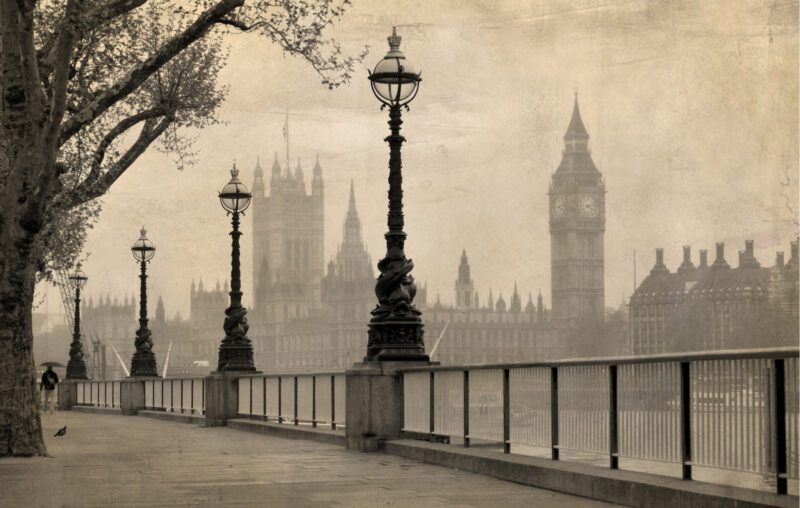Herbert Spencer’s Critique of the Board of Health in 1851

In the 19th century, outbreaks of Cholera were common, and Britain deployed a “Board of Health” to manage and suppress the disease. England experienced a particularly severe wave of outbreaks in 1848 and 1849, with recurring instances over the next decade and a half.
The Board of Health in London adopted the consensus belief that Cholera spread by miasmic properties, which is to say “bad air” that supposedly caused the disease to linger in the vicinity of sewage, garbage, and similar sanitary problems. Address these concerns and the disease would vanish, or so the logic followed. The Board of Health accordingly hired and deployed teams of sanitary inspectors around the city to oversee and regulate the improvement of sewage systems that would carry the perceived source of Cholera away.
Although the Board of Health was conceived of as a government body to lead the effort to improve and regulate sanitary conditions in accordance with scientific expertise, it quickly became an entrenched political interest devoted to the perpetuation of its own power and expansion of its own budget.
The 19th century liberal philosopher Herbert Spencer included a devastating critique of the Board of Health in his 1851 book Social Statics, which argued that the bureaucratic properties of the agency had led it astray from its mission and even created an impediment to public health (David Hart provides a lengthy discussion of Spencer’s writings on sanitation here).
Instead of taking immediate mitigation measures to prepare for an epidemic that had already stricken continental Europe, the Board devoted its energies to long-term engineering projects to improve the city’s sewer system. Some of these projects would eventually yield sanitary benefits. But they also provided lucrative money-making opportunities for politically connected contractors, and – due to the prevailing miasma theory – they largely misdiagnosed the causes of Cholera. Although the sewer improvements removed stagnant sources of waste and refuse, they also deposited them in the Thames – the major source of drinking water for the city. The “improvements,” premised on eliminating miasmas from the air, thereby further spread the water-carried disease.
Spencer’s indictment of the public health bureaucracy catalogued these and other successions of government missteps in fighting off Cholera. The public health agencies became a lucrative political interest, invested in holding up an erroneous “scientific consensus” about how the disease spread. Medical journals such as the Lancet became advocacy vehicles for expanding the public health bureaucracy’s “sanitary” oversight, along with accompanying budgetary appropriations.
Two years after Spencer wrote his chapter another Cholera outbreak hit London’s SoHo district, seemingly concentrated in the vicinity of a water pump. The outbreak is now regarded as one of the most famous events in the history of epidemiology (see Robert Wright’s account here). A physician named John Snow theorized that Cholera spread by contaminated water that carried an associated pathogen, rather than “bad air.” Facing intense skepticism from the miasma-oriented medical consensus viewpoint, Snow convinced the local council to remove the pump handle from the suspected source – the contaminated Broad Street well. Snow’s theory, as we now know, was correct and the natural experiment proved the water-born nature of the underlying pathogen.
Despite Snow’s discovery, the political interests behind the public health bureaucracy resisted its implications for the next decade as Cholera continued to ravage Britain’s cities. Just as Spencer predicted, the Board and its supportive medical establishment acted in the interest of their own perpetuation rather than true public health.
The Lancet, whose owner Spencer identified in 1852 as an advocacy vehicle for expansive public health expenditures rather than scientific knowledge, published a harsh editorial denunciation of Snow in 1855. The General Board of Health commissioned a medical council investigation of Snow’s theory as well, attacking it as scientifically unsound. “After careful inquiry,” they wrote, “we see no reason to adopt this belief. We do not find it that the water was contaminated in the manner alleged.” Instead, the Board reverted back to the disproven but politically entrenched miasma theory:
Thus, if the Broad Street pump did actually become a source of disease to persons dwelling at a distance, we believe that this may have depended on other organic impurities than those exclusively referred to, and may have arisen, not in its containing choleraic excrements, but simply in the fact of its impure waters having participated in the atmospheric infection of the district.
The Board’s position has since been thoroughly discredited. Indeed, it was a former rival of Snow and miasma theory adherent William Farr who statistically repeated and verified Snow’s theory during another outbreak in 1866. But the damage was already done. Although Snow’s work revealed the answer to the Cholera problem in 1854, the biggest obstacle to operationalizing this knowledge into fighting the disease was the public health bureaucracy itself and the entrenched political interests it had come to represent. Snow’s experience, in effect, proved the reality of Herbert Spencer’s assessment. Rather than improve public health, the government had only distorted and politicized the necessary scientific processes.
Sanitary Supervision (Excerpts)
By Herbert Spencer
The current ideas respecting legislative interference in sanitary matters do not seem to have taken the form of a definite theory. The Eastern Medical Association of Scotland does indeed hold “that it is the duty of the state to adopt measures for protecting the health as well as the property of its subjects;” and the Times lately asserted that “the Privy Council is chargeable with the health of the Empire;” a but no considerable political party has adopted either of these dogmas by way of a distinct confession of faith. Nevertheless, the opinions that widely prevail on questions of sewage, watersupply, ventilation, and the like, fully commit their advocates to the belief these dogmas embody.
That it comes within the proper sphere of government to repress nuisances is evident. He who contaminates the atmosphere breathed by his neighbour, is infringing his neighbour’s rights. Men having equal claims to the free use of the elements—having faculties which need this free use of the elements for their due exercise—and having that exercise more or less limited by whatever makes the elements more or less unusable, are obviously trespassed against by any one who unnecessarily vitiates the elements, and renders them detrimental to health, or disagreeable to the senses; and in the discharge of its function as protector, a government is obviously called upon to afford redress to those so trespassed against.
Beyond this, however, it cannot lawfully go. As already shown in several kindred cases, for a government to take from a citizen more property than is needful for the efficient defence of that citizen’s rights, is to infringe his rights—is, consequently, to do the opposite of what it, the government, is commissioned to do for him—or, in other words, is to do wrong. And hence all taxation for sanitary superintendence coming, as it does, within this category, must be condemned.
II.
This theory, of which Boards of Health and the like are embodiments, is not only inconsistent with our definition of state-duty, but is further open to strictures, similar to, and equally fatal with, those made in analogous cases. If by saying “that it is the duty of the state to adopt measures for protecting the health of its subjects,” it is meant (as it is meant by the majority of the medical profession) that the state should interpose between quacks and those who patronize them, or between the druggist and the artizan who wants a remedy for his cold—if it is meant that to guard people against empirical treatment, the state should forbid all unlicensed persons from prescribing—then the reply is, that to do so is directly to violate the moral law. Men’s rights are infringed by these, as much as by all other trade interferences. The invalid is at liberty to buy medicine and advice from whomsoever he pleases; the unlicensed practitioner is at liberty to sell these to whomsoever will buy. On no pretext whatever can a barrier be set up between them, without the law of equal freedom being broken; and least of all may the government, whose office it is to uphold that law, become a transgressor of it.
Moreover this doctrine, that it is the duty of the state to protect the health of its subjects, cannot be established, for the same reason that its kindred doctrines cannot, namely, the impossibility of saying how far the alleged duty shall be carried out. Health depends upon the fulfilment of numerous conditions—can be “protected” only by ensuring that fulfilment: if, therefore, it is the duty of the state to protect the health of its subjects, it is its duty to see that all the conditions of health are fulfilled by them. Shall this duty be consistently discharged? If so, the legislature must enact a national dietary: prescribe so many meals a day for each individual; fix the quantities and qualities of food, both for men and women; state the proportion of fluids, when to be taken, and of what kind; specify the amount of exercise, and define its character; describe the clothing to be employed; determine the hours of sleep, allowing for the difference of age and sex: and so on with all other particulars, necessary to complete a perfect synopsis, for the daily guidance of the nation: and to enforce these regulations it must employ a sufficiency of duly-qualified officials, empowered to direct every one’s domestic arrangements. If, on the other hand, a universal supervision of private conduct is not meant, then there comes the question—Where, between this and no supervision at all, lies the boundary up to which supervision is a duty? To which question no answer can be given.
III.
There is a manifest analogy between committing to government-guardianship the physical health of the people, and committing to it their moral health. The two proceedings are equally reasonable, may be defended by similar arguments, and must stand or fall together. If the welfare of men’s souls can be fitly dealt with by acts of parliament, why then the welfare of their bodies can be fitly dealt with likewise. He who thinks the state commissioned to administer spiritual remedies, may consistently think that it should administer material ones. The disinfecting society from vice may naturally be quoted as a precedent for disinfecting it from pestilence. Purifying the haunts of men from noxious vapours may be held quite as legitimate as purifying their moral atmosphere. The fear that false doctrines may be instilled by unauthorized preachers, has its analogue in the fear that unauthorized practitioners may give deleterious medicines or advice. And the persecutions once committed to prevent the one evil, countenance the penalties used to put down the other. Contrariwise, the arguments employed by the dissenter to show that the moral sanity of the people is not a matter for state superintendence, are applicable, with a slight change of terms, to their physical sanity also.
Let no one think this analogy imaginary. The two notions are not only theoretically related; we have facts proving that they tend to embody themselves in similar institutions. There is an evident inclination on the part of the medical profession to get itself organized after the fashion of the clericy. Moved as are the projectors of a railway, who, whilst secretly hoping for salaries, persuade themselves and others that the proposed railway will be beneficial to the public—moved as all men are under such circumstances, by nine parts of self-interest gilt over with one part of philanthropy—surgeons and physicians are vigorously striving to erect a medical establishment akin to our religious one. Little do the public at large know how actively professional publications are agitating for state-appointed overseers of the public health. Take up the Lancet, and you shall find articles written to show the necessity of making poor-law medical officers independent of Boards of Guardians by appointing them for life, holding them responsible only to central authority, and giving them handsome salaries from the Consolidated Fund. The Journal of Public Health proposes that “every house on becoming vacant be examined by a competent person as to its being in a condition adapted for the safe dwelling in of the future tenants;” and to this end would raise by fees, chargeable on the landlords, “a revenue adequate to pay a sufficient staff of inspectors four or five hundred pounds a year each.” A non-professional publication, echoing the appeal, says—“No reasonable man can doubt that if a proper system of ventilation were rendered imperative upon landlords, not only would the cholera and other epidemic diseases be checked, but the general standard of health would be raised.” Whilst the Medical Times shows its leanings, by announcing, with marked approbation, that “the Ottoman government has recently published a decree for the appointment of physicians to be paid by the state,” who “are bound to treat gratuitously all—both rich and poor—who shall demand advice.”
More or less distinctly expressed in these passages there is an unmistakable wish to establish an organized, tax-supported class, charged with the health of men’s bodies, as the clergy are charged with the health of their souls. And whoever has watched how institutions grow—how by little and little a very innocent-looking infancy unfolds into a formidable maturity, with vested interests, political influence, and a strong instinct of self-preservation, will see that the germs here peeping forth are quite capable, under favourable circumstances, of developing into such an organization. He will see further, that favourable circumstances are not wanting—that the prevalence of unemployed professional men, with whom these proposals for sanitary inspectors and public surgeons mostly originate, is likely to continue; and that continuing, it will tend to multiply the offices it has created, much in the same way that the superabundance of clergy multiplies churches. He will even anticipate that, as the spread of education is certain to render the pressure upon the intellectual labour-market still more intense than it now is, there will by-and-by be a yet greater stimulus to the manufacture of berths—a yet greater tendency on the part of all who want genteel occupations for their sons, to countenance this manufacture—and, therefore, a yet greater danger of the growth of a medical establishment.
IV.
The most specious excuse for not extending to medical advice the principles of free-trade, is the same as that given for not leaving education to be diffused under them; namely, that the judgment of the consumer is not a sufficient guarantee for the goodness of the commodity. The intolerance shown by orthodox surgeons and physicians, towards unordained followers of their calling, is to be understood as arising from a desire to defend the public against quackery. Ignorant people say they cannot distinguish good treatment from bad, or skilful advisers from unskilful ones: hence it is needful that the choice should be made for them. And then, following in the track of priesthoods, for whose persecutions a similar defence has always been set up, they agitate for more stringent regulations against unlicensed practitioners, and descant upon the dangers to which men are exposed by an unrestricted system. Hear Mr. Wakley. Speaking of a recently-revived law relating to chemists and druggists, he says, “It must have the effect of checking, to a vast extent, that frightful evil called counter practice, exercised by unqualified persons, which has so long been a disgrace to the operation of the laws relating to medicine in this country, and which, doubtless, has been attended with a dreadful sacrifice of human life.” (Lancet, Sept. 11, 1841.) And again, “There is not a chemist and druggist in the empire who would refuse to prescribe in his own shop in medical cases, or who would hesitate day by day to prescribe simple remedies for the ailments of infants and children.” ∗ ∗ ∗ ∗ “We had previously considered the evil to be of enormous magnitude, but it is quite clear that we had under-estimated the extent of the danger to which the public are exposed.” (Lancet, Oct. 16, 1841.)
Any one may discern through these ludicrous exaggerations much more of the partizan than of the philanthropist. But let that pass. And without dwelling upon the fact, that it is strange a “dreadful sacrifice of human life” should not have drawn the attention of the people themselves to this “frightful evil,”—without doing more than glance at the further fact, that nothing is said of those benefits conferred by “counter practice,” which would at least form a considerable set-off against this “evil of enormous magnitude,”—let it be conceded that very many of the poorer classes are injured by druggists prescriptions and quack medicines. The allegation having been thus, for argument’s sake, admitted in full, let us now consider whether it constitutes a sufficient plea for legal interference….
V.
Turning now to consider these impatiently-agitated schemes for improving our sanitary condition by act of parliament, the first criticism to be passed upon them is that they are altogether needless, inasmuch as there are already efficient influences at work gradually accomplishing every desideratum.
Seeing, as do the philanthropic of our day, like the congenitally blind to whom sight has just been given—looking at things through the newly-opened eyes of sympathy—they form very crude and very exaggerated notions of the evils to be dealt with. Some, anxious for the enlightenment of their fellows, collect statistics exhibiting a lamentable amount of ignorance; publish these; and the lovers of their kind are startled. Others dive into the dens where poverty hides itself, and shock the world with descriptions of what they see. Others, again, gather together information respecting crime, and make the benevolent look grave by their disclosures. Whereupon, in their horror at these revelations, men keep thoughtlessly assuming that the evils have lately become greater, when in reality it is they who have become more observant of them. If few complaints have hitherto been heard about crime, and ignorance, and misery, it is not that in times past these were less widely spread; for the contrary is the fact; but it is, that our forefathers were comparatively indifferent to them—thought little about them, and said little about them. Overlooking which circumstance, and forgetting that social evils have been undergoing a gradual amelioration—an amelioration likely to progress with increasing rapidity—many entertain a needless alarm lest fearful consequences should ensue, if these evils are not immediately remedied, and a visionary hope that immediate remedy of them is possible.
Such are the now prevalent feelings relative to sanitary reform. We have had a multitude of blue-books, Board of Health reports, leading articles, pamphlets, and lectures, descriptive of bad drainage, overflowing cesspools, festering graveyards, impure water, and the filthiness and humidity of low lodging houses. The facts thus published are thought to warrant, or rather to demand, legislative interference. It seems never to be asked, whether any corrective process is going on. Although every one knows that the rate of mortality has been gradually decreasing, and that the value of life is higher in England than elsewhere—although every one knows that the cleanliness of our towns is greater now than ever before, and that our spontaneously-grown sanitary arrangements are far better than those existing on the Continent, where the stinks of Cologne, the uncovered drains of Paris, the water-tubs of Berlin, and the miserable footways of the German towns, show what state-management effects—although every one knows these things, yet is it perversely assumed that by state-management only can the remaining impediments to public health be removed. Surely the causes which have brought the sewage, the paving and lighting, and the water-supply of our towns, to their present state, have not suddenly ceased. Surely that amelioration, which has been taking place in the condition of London for these two or three centuries, may be expected to continue. Surely the public spirit, which has carried out so many urban improvements since the Municipal Corporations Act gave greater facilities, can carry out other improvements. Surely, if all that has been done towards making cities healthy, has been done, not only without government aid, but in spite of government obstructions—in spite, that is, of the heavy expense of local acts of parliament—we may reasonably suppose, that what remains to be done can be done in the same way, especially if the obstructions are removed. One would have thought that less excuse for meddling existed now than ever. Now that so much has been effected; now that spontaneous advance is being made at an unparalleled rate; now that the laws of health are beginning to be generally studied; now that people are reforming their habits of living; now that the use of baths is spreading; now that temperance, and ventilation, and due exercise are getting thought about—to interfere now, of all times, is surely as rash and uncalled-for a step as was ever taken….
Let those who are anxious to improve the health of the poor, through the indirect machinery of law, bring their zeal to bear directly upon the work to be done. Let them appeal to men’s sympathies, and again to their interests. Let them prove to people of property that the making of these reforms will pay. Let them show that the productive powers of the labourer will be increased by bettering his health, whilst the poors’-rates will be diminished. Above all, let them demand the removal of those obstacles which existing legislation puts in the way of sanitary improvements. Their efforts thus directed will really promote progress. Whereas their efforts as now directed are either needless or injurious.
VI.
These endeavours to increase the salubrity of town-life by law, are not only open to the criticism that the natural forces already at work render them unnecessary, and to the additional criticism that some of the things strained after are impossible of legislative achievement, but it must further be observed, that even the desiderata which acts of parliament will reach, can be so reached only through very faulty instrumentalities. It is, in this case, as in many others, the peculiarity of what are oddly styled “practical measures,” that they supersede agencies which are answering well by agencies which are not likely to answer well. Here is a heavy charge of inefficiency brought against the drains, cesspools, stink-traps, &c., of England in general, and London in particular. The evidence is voluminous and conclusive, and by common consent a verdict of proven is returned. Citizens look grave and determine to petition parliament about it. Parliament promises to consider the matter; and after the usual amount of debate, says—“Let there be a Board of Health.” Whereupon petitioners rub their hands, and look out for great things. They have unbounded simplicity—these good citizens. Legislation may disappoint them fifty times running, without at all shaking their faith in its efficiency. They hoped that Church abuses would be rectified by the Ecclesiastical Commission: the poor curates can say whether that hope has been realized. Backed by an act of parliament, the Poor-Law Commissioners were to have eradicated able-bodied pauperism: yet, until checked by the recent prosperity, the poors’-rates have been rapidly rising to their old level. The New Building Act was to have given the people of London better homes; whereas, as we lately saw, it has made worse the homes that most wanted improving. Men were sanguine of reforming criminals by the silent system, or the separate system; but, if we are to judge by the disputes of their respective advocates, neither of these plans is very successful. Pauper children were to have been made into good citizens by industrial education; from all quarters, however, come statements that a very large percentage of them get into goal, or become prostitutes, or return to the workhouse. The measures enjoined by the Vaccination Act of 1840 were to have exterminated small-pox; yet the Registrar-General’s reports show that the deaths from small-pox have been increasing. And thus does year after year add to those abortive schemes, of which so many have been quoted (pp. 8, 46,288). Yet scarcely a doubt seems to arise, respecting the competency of legislators to do what they profess. From the times when they tried to fix the value of money down to our own day, when they have but just abandoned the attempt to fix the price of corn, statesmen have been undertaking all kinds of things, from regulating the cut of boot-toes, up to preparing people for Heaven; and have been constantly failing, or producing widely-different results from those intended. Nevertheless such inexhaustible faith have men, that, although they see this, and although they are daily hearing of imbecilities in public departments—of Admiralty Boards that squander three millions a year in building bad ships and breaking them up again—of Woods and Forests Commissioners who do not even know the rental of the estates they manage—of bungling excise-chemists who commit their chiefs to losing prosecutions, for which compensation has to be made—yet government needs but to announce another plausible project, and men straightway hurrah, and throw up their caps, in the full expectation of getting all that is promised.
But the belief that Boards of Health, and the like, will never effect what is hoped, needs not wholly rest either upon abstract considerations, or upon our experience of state-instrumentalities in general. We have one of these organizations at work, and, as far as may be at present judged, it has done anything but answer people’s expectations. To condemn it, because choked sewers, and open gully-holes, and filthy alleys remain much as they were, would, perhaps, be unreasonable, for time is needed to rectify evils so widely established. But there is one test by which we may fairly estimate its efficiency, viz., its conduct before and during the late pestilence. It had more than a year’s notice that the cholera was on its way here. There were two whole sessions of parliament intervening between the time when a second invasion from that disease was foreseen and the time when the mortality was highest.
The Board of Health had, therefore, full opportunity to put forth its powers, and to get greater powers if it wanted them. Well, what was the first step that might have been looked for from it? Shall we not say the suppression of intramural interments? Burying the dead in the midst of the living was manifestly hurtful; the evils attendant on the practice were universally recognised; and to put it down required little more than a simple exercise of authority. If the Board of Health believed itself possessed of authority sufficient for this, why did it not use that authority when the advent of the epidemic was rumoured? If it thought its authority not great enough (which can hardly be, remembering what it ultimately did), then why did it not obtain more? Instead of taking either of these steps, however, it occupied itself in considering future modes of water-supply, and devising systems of sewage. Whilst the cholera was approaching, the Board of Health was cogitating over reforms, from which the most sanguine could not expect any considerable benefit for years to come. And then, when the enemy was upon us, this guardian, in which men were putting their trust, suddenly bestirred itself, and did what, for the time being, made worse the evils to be remedied. As was said by a speaker, at one of the medical meetings held during the height of the cholera, “the Commissioners of Public Health had adopted the very means likely to produce that complaint. Instead of taking their measures years ago, they had stirred up all sorts of abominations now. They had removed dunghills and cesspools, and added fuel tenfold to the fire that existed. (Hear, hear.) Never since he could recollect had there been such accumulations of abominable odours as since the Health of Towns Commission had attempted to purify the atmosphere. (A laugh, and Hear, hear.)”
At length, when, in spite of all that had been done (or, perhaps, partly in consequence of it), the mortality continued to increase, the closing of graveyards was decided upon, in the hope, as we must suppose, that the mortality would thereby be checked. As though, when there were hundreds of thousands of bodies decomposing, the ceasing to add to them would immediately produce an appreciable effect!
If to these facts we add the further one, that, notwithstanding the directions issued for prophylactic treatment, and the system of domiciliary visits, the cholera carried off a greater number than before, we have some reason for thinking that this sanitary guardianship did no good, but, it may be, even harm.
Should it be said that the Board of Health is badly constituted, or has not sufficient power, and that had a better organization been given to it we should have seen different results, the reply is, that the almost invariable occurrence of some such fatal hitch is one of the reasons for condemning these interferences. There is always some provoking if in the way. If the established clergy were what they should be, a state-church might do some good. If parish relief were judiciously administered, a poor-law would not be so bad thing. And if a sanitary organization could be made to do just what it is intended to do, something might be said in its favour.










